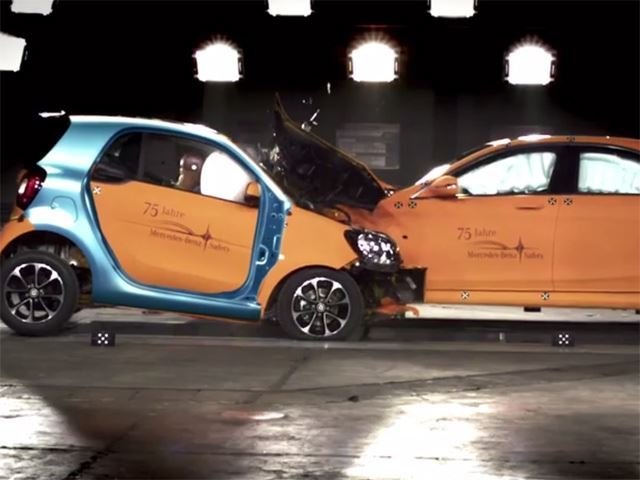This week we will tackle another common belief that bigger cars are inherently safer. The basis of this belief stems from parents who think that teenage drivers will be safer in a big SUV compared to a small economy car. Bigger cars have more mass and should therefore hold the advantage in a head-to-head crash. This theory seems like it might be true, so we will see if we can prove it one way or the other. Is bigger always better?
When analyzing crash statistics, people like to focus on head-on crash stats. These show how two cars will fare when they collide head-on. According to the Insurance Institute for Highway Safety, these types of crashes account for nearly half of all vehicle deaths in the US. Based on analysis of over 83,000 crashes, researchers concluded that vehicle type actually had a bigger effect on crash safety than overall ratings did. Due to basic physics, the car with the extra mass will push the other car. SUVs are typically bigger than sedans. However, just picking an SUV because it is big doesn't always mean that it is safer. For example, SUVs have a higher center of gravity and are more likely to roll over.
Since 2012, stability control has been mandatory on new cars which does help to prevent rollovers. There were still 6,800 deaths due to rollovers in 2010 that were caused by not wearing a seat belt, so these deaths were easily preventable. Smaller cars have also become increasingly safer with up-to-date safety features like ABS, side curtain airbags, and stability control. These cars have also done better in crash avoidance tests in both wet and dry braking. Even better than surviving a crash is avoiding it all together, and the more agile nature of smaller cars creates an advantage in this area. Perhaps the best way to be safe is not just to have a bigger car, but a heavier car.
The IIHS has tested hybrid and non-hybrid versions of the same car to see if the heavier hybrid car would fair better in a crash. Analysis of insurance claims found that the hybrid drivers were actually 25% less likely to be injured than those in the same, gas-powered car. Although this may be due to the fact that people who drive hybrids are just safer drivers. The gap between the safety of small cars and SUVs is getting smaller every year. SUVs and trucks are still technically safer, but improvements to safety in small cars continues to narrow the gap. When looking at a car for your teen, don't just automatically assume that buying an old SUV will make them safer. In fact, newer small cars with more safety features might be the better choice.
Related News

